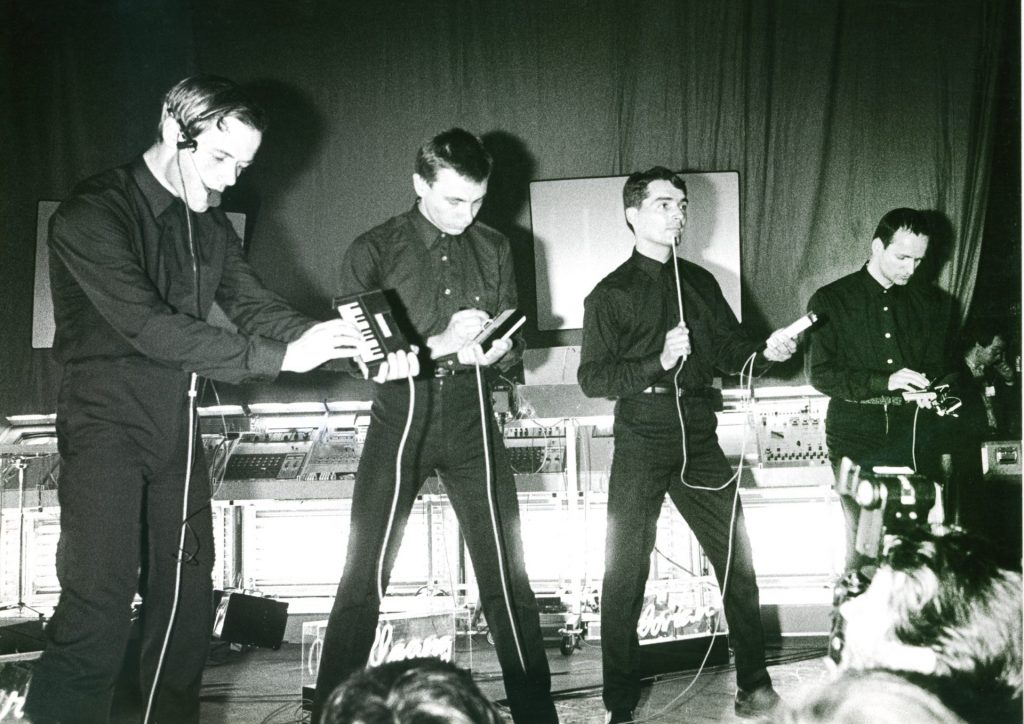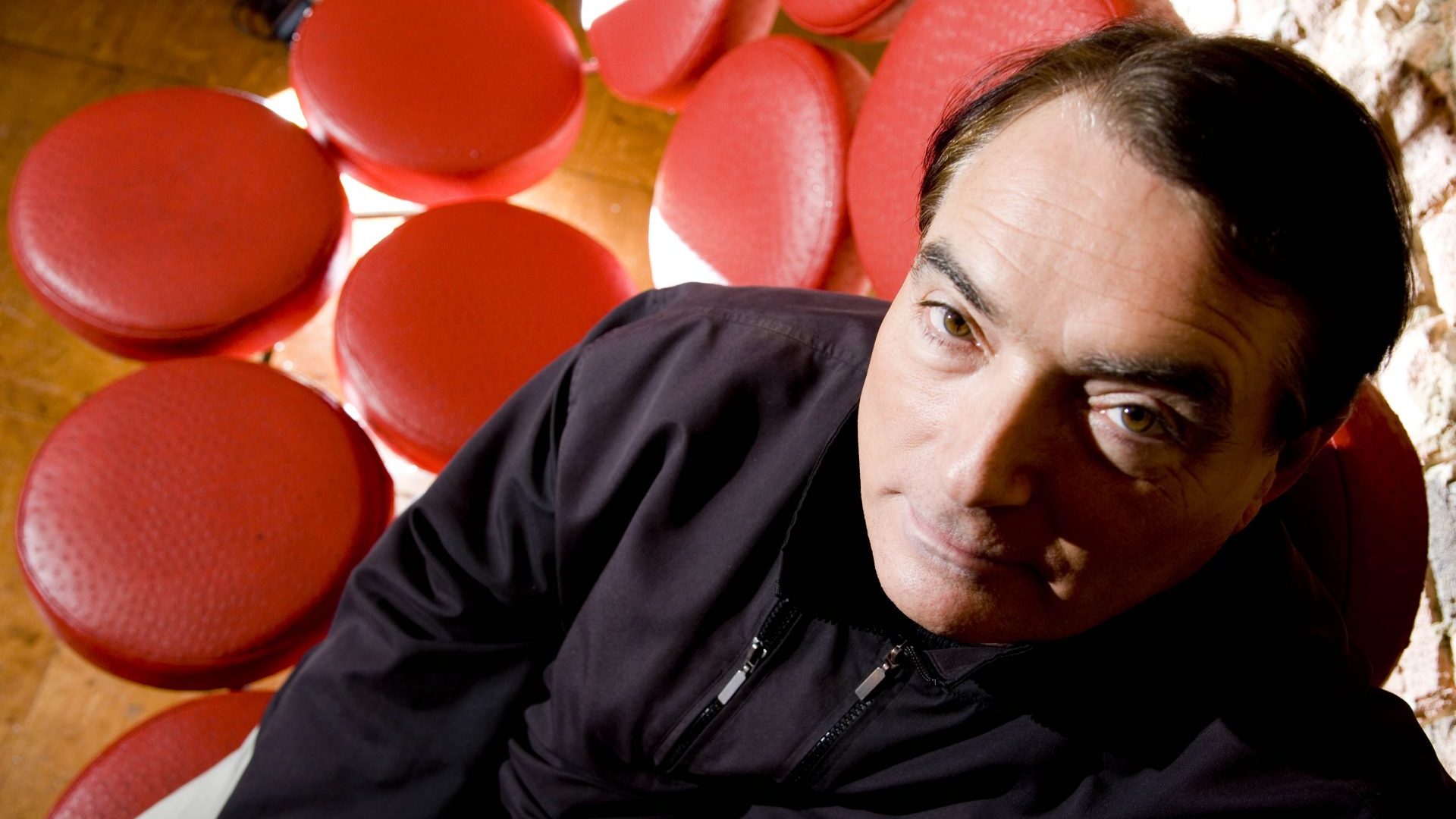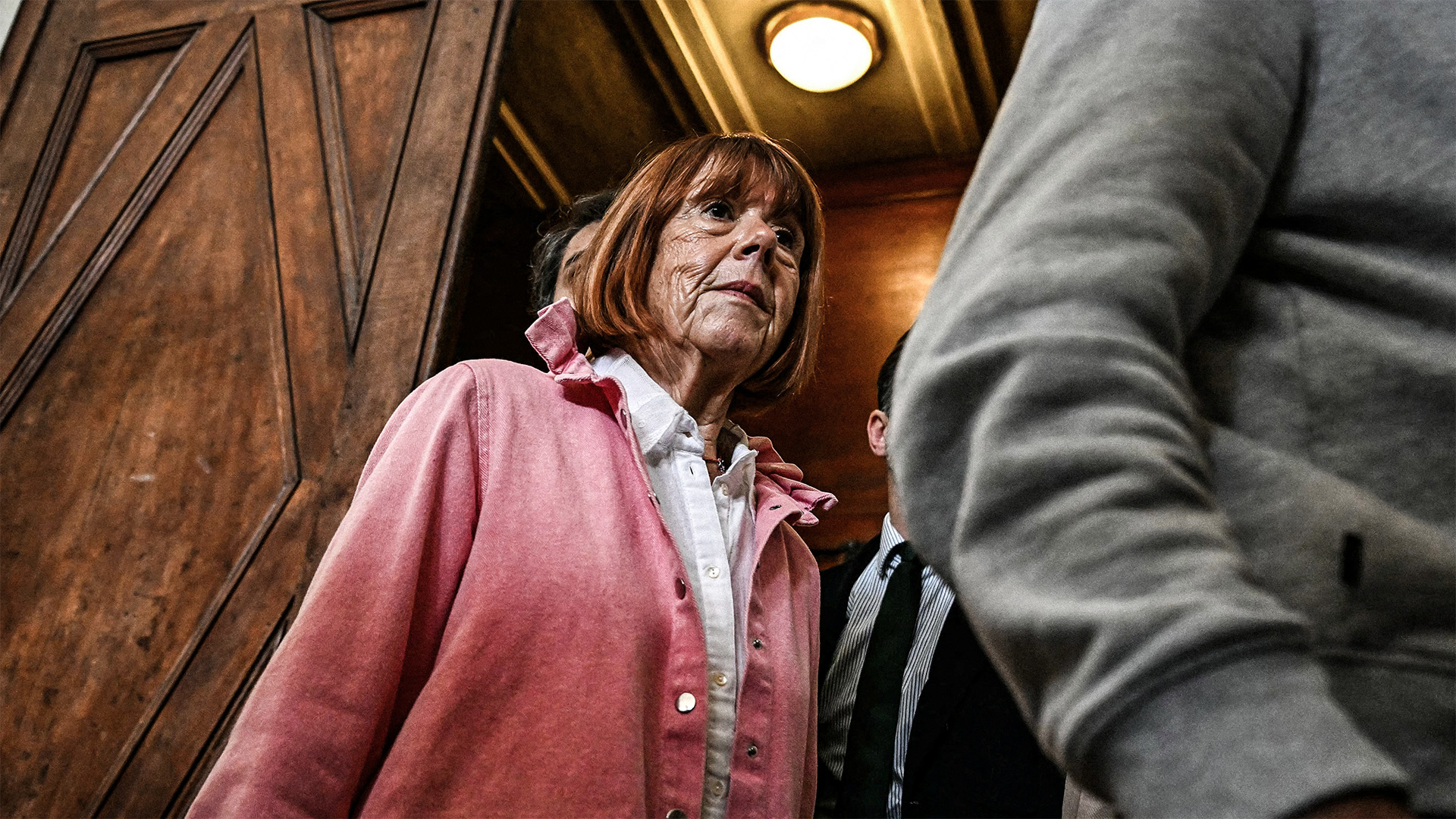It’s September 1975, and German pioneers Kraftwerk are performing at the Liverpool Empire. A fitting venue, perhaps, for a band that became known as electronic music’s Beatles, then riding the crest of a wave following the global success of breakthrough album Autobahn.
That show would have a profound effect on future OMD co-founder and lead singer Andy McCluskey. Then in teenage band Equinox, McCluskey heard something that changed his whole approach to music, a sign of the impact Kraftwerk would have on a generation of young British musicians.
Among that classic Kraftwerk line-up during electronic music’s golden age was percussionist Wolfgang Flür, who recalls McCluskey’s reaction: “He came with his whole band. They came to our dressing room afterwards, very shy, shivering hands, and could not look into our faces, just speaking to us and looking at the floor.
“They said, ‘you have showed us the future of music, so, we [will] throw away our guitars tomorrow and buy synthesisers’. So British synth pop was born with them, I think. Many others copied it, and this Brit sound is very successful.”

It’s testament to Kraftwerk’s enduring influence, and Flür’s rebirth and evolution as a flourishing solo artist, that a stellar line-up of musicians have queued up to work with him. Latest album Times, like Magazine 1 in 2022 (both released on Cherry Red), features collaborations with some of the biggest names in electronic music – German techno pioneers U96, Boris Blank of Swiss electronic band Yello, Juan Atkins from Detroit, German composer/producer Anthony Rother, and Peter Hook, formerly of New Order.
Ironically, while Flür remains good friends with McCluskey, the Liverpudlian turned down the opportunity to sing on a track named Birmingham on Magazine 1. Understandable, says Flür, “we have that same problem between Düsseldorf and Cologne”.
Almost 40 years after walking away from his old band in 1986, Flür, now 78, continues his 2025 tour with UK dates in November. His unplanned musical comeback as a solo artist, sparked initially by his horror at the Bosnian war – in the form of a 1990s benefit single – shows no signs of abating. Thriving on collaboration, this amiable man with an impish sense of humour is fully at peace with his place in music and life.
While Flür’s role as a percussionist manifests itself through his emphasis on rhythms, his solo work also displays a highly melodic retro-futurism with a dramatic electronic/synth sensibility instilled during his time with Kraftwerk. It’s underpinned by a sense of romanticism, something he says he inherits from his mother, who played a lot of classical music.
“I inherited it from my mama,” he says. “She was very vivacious, and very romantic. I got that from her. On the other hand, I’m a Cancer, and Cancers are all romantic.
“But I had that already in me when I entered Kraftwerk, because they had also these very similar romantic melodies, but played with technical instruments. That didn’t matter. If an artist has that in his soul, he does that, no matter which instrument. A fiddle or a synthesiser. I cannot do different. That’s me.”
Yet Flür’s first foray into drumming came performing a mix of Merseybeat and R&B in 1960s Düsseldorf bands the Beathovens and the Spirits Of Sound alongside guitarist Michael Rother, who would also play with Kraftwerk before forming fellow electronic trailblazers Neu!
At odds with his later image as one of Kraftwerk’s machine men, he drew inspiration from Keith Moon, beating the kit as violently as the Who’s drummer.
“He brought me from Merseybeat to brutal drumming,” he laughs. “There exist pictures where I really looked like him. That’s crazy! I didn’t do something to look like him. It was that I had the same haircut and I tried really, really brutal [drumming]. With the Spirits of Sound we had hard evenings and sometimes my hands were bleeding with the sticks. Sometimes I broke sticks. Can you believe how hard I drummed the snare!”
It was a world away from the minimal electro drumming he pioneered in Kraftwerk. “The difference couldn’t be bigger. I had to have my time to leave the original drumming to get into this concentrated electronics drum, standing up with not one drop of sweat on my body.”
Approached by founding members Florian Schneider and Ralf Hütter in summer 1973, he made his stage debut with Kraftwerk performing Tanzmusik on long-running German television arts show Aspekte that October. The performance saw the band unveil the revolutionary electronic drum pads board fashioned over the preceding weeks. The starting point was an automatic Farfisa Rhythm 10 box, to which was added a device with metal plates housed in a wooden case, which allowed it to be played like a real drum kit.
“The idea came from Florian and me together. But I had the handicraft to do that because I was a trained carpenter,” says Flür.
“It showed me the way of future drumming, this historical idea when I saw on the TV and me, the first time with this pad drumming, with all these crazy wirings hanging out of the backside, when it was the very first thing we built for a TV show. Then I understood to stay with them and give them a little bit more electronics to their instruments, because [a] regular drum set would not fit to their music.”
By the time McCluskey saw Kraftwerk in Liverpool in 1975, Autobahn had reached the top 10 on both sides of the Atlantic, while the title track provided them with a hit single. Karl Bartos duly completed Kraftwerk’s classic line-up ahead of that year’s major world tour. Follow-up album Radio-Activity hit No 1 in France, the other European hotbed of electronic music.
“Of course, we noticed what was happening in England and anywhere in the world when people started with electronic music,” says Flür. “Especially France, [which] was very big for electronics. That’s the only country besides England where Kraftwerk had a No 1 hit [double A-side The Model /Computer Love]. That’s crazy.
“Radioactivity is a special track. It has maybe a chanson [quality], because there’s sad singing on it.”
Suggested Reading


An Iranian exile’s rebellion in sound
Future albums saw them shift further towards melodic electronic songs, then firmly into clubland territory. The futuristic The Man-Machine (1978) satirised man’s growing dependence on and symbiotic relationship with machines. Its cover captures the iconic Kraftwerk look, the four expressionless in matching red shirts and lipstick with black ties, the machine men incarnate.
Flür grew disillusioned throughout the 1980s and has spoken in interviews about feeling underused in his last years with the band, sequencers making his role increasingly redundant. He also grew frustrated by the lack of music being produced, with just two albums released during the decade.
Feeling he had no future with drumming, he took the decision to leave.
“On the other hand, the dynamic between us four people was no longer that good,” he says. “Everyone had his own ideas for the future. Some were only with their girlfriends, the others were only driving bicycles. And so, I was not into bicycle driving so much, and there was no more music produced. It was frustrating for me.”
He found a new calling, drawing on his cabinet-maker’s apprenticeship and interior design training when he joined friends who ran a furniture design business in their atelier.
“Düsseldorf is a rich city, so we had a lot of orders from architects, lawyers and advertising companies,” he says. “We also did prop building for advertising and films. It was a very good time. For six years we were very successful. I thought this could be my future.
“I did not think about music any more. And so I was no longer frustrated. It melted away my memories of being on stage and getting huge applause.”
But his outrage at the horrors unfolding on his TV during the Bosnian war prompted a return to music.
“When the war came here in the middle of Europe, [just] an hour’s flight from Düsseldorf,” he says, “I saw all these bad images, like we see in Ukraine today. Suddenly came this idea to record a song, to play a little melody for the children of a Sarajevo children’s home. It was a brutal, brutal story. I thought we artists must do that, because the politicians don’t do enough.”
He wrote his first lyrics for benefit track Little Child together with friend and former Kraftwerk collaborator Emil Schult, and became committed to the cause of helping children wounded in Bosnia, aiming to win public support for urgently needed medical assistance.
In his autobiography I Was A Robot, he wrote: “Little Child was the spark that lit a small fire, which quickly blazed in me, awakening my desire for a completely new music project. Thus Yamo was born, which helped my self-confidence no end.”
“I was so proud,” he tells me. “I thought, hey, you’re becoming your own musician without Kraftwerk.”
He appeared in his new guise for the first time at the Cologne Popkomm in late summer 1993, staging a performance art piece as Schult delivered a spirited speech about the victims of war.
His new musical manifesto is “a humane kind of electro pop”. In interviews to promote Yamo’s 1997 album Time Pie (as per I Was A Robot), he explained he wanted to do something that took him further away from Kraftwerk and “more towards themes of humanity and softer tones. I no longer wanted to describe the world of machines, but rather to say something about people.
“I’m simply no longer interested in those kinds of subjects, about the immortal man machine and computers. I want to record stories about people and their individuality; however absurd they may be.”
His musical renaissance saw him take on a dual role as melodist and storyteller. Time Pie was accompanied by a newspaper expanding on the album’s themes through sketches, graphics and stories, while Magazine 1 and Times tackle a range of topical issues, magazine style – such as Planet In Fever’s take on climate change, a song written with Schult. All shot through with an optimistic hope for humanity.
Time Pie established a template for his solo work, which has seen him forge new and lasting friendships and partnerships. He worked closely with Düsseldorf electronic duo Mouse on Mars on Time Pie, while producer Stefan Lindlahr came on board for 2015’s Eloquence, which also featured Bon Harris of British EBM band Nitzer Ebb. His close friend Yorkshire-based producer and composer Peter Duggal has been his musical collaborator on his two most recent albums, and a third is planned.
I ask what it means to work with so many legends. “Isn’t it crazy? Could I believe it 10 years ago? No, but it happened. I thought to myself, I don’t have a band like I had with Kraftwerk. The whole world could be my band if I found a musician who is friendly, who has a similar chemistry and a music I like.”
Flür’s foray into live work followed a top 10 hit in the German dance charts. Invited to DJ on the British club circuit in the early 2000s, his live show evolved into a multimedia experience with a DJ set and a strong theatrical element. With a strong pacifist, anti-war stance, it’s named Musik Soldat after the satirical climax that sees Flür march across stage, an anti-war movie playing behind him.
“Peter and I are both very positive people,” he explains. “We have the nicest business we can imagine, creating music and making people happy every night. They love our music, which is a little bit different than on the album, which is pop music. What we play on the night is more danceable.
“Our programme is called Musik Soldat. This is a programme against war. We are both pacifists and humanists, and so our audience must understand our personalities, why we do this and why I march wearing a spiked helmet on my head. It’s ironically meant, [a protest] against the military and everything to do with fighting.”
His pacifism is deep-rooted. As a young man, he refused national service and was called in front of a judge and a senior military officer to argue his case.
“That’s my personality. It was not so easy in the 60s to avoid military service. So I had a very hard thing to prove, to let them see my soul, and to say I would never touch any gun, any pistol, or anything that could kill other people.”
He won his case, arguing that he wanted to do something good for the people of his country, outlining the work he had already lined up in the laboratory of a Düsseldorf hospital. The judge agreed to send him to work there instead. After his civilian service finished, the hospital asked him to stay on, but music was calling.
“I needed a stage and an audience. I had already smelled blood with my amateur band. We had played nearly every week, so they had no chance.”
There was a postscript to his Kraftwerk period. After many years, he had an emotional final meeting with Schneider in May 2016 when he saw his old bandmate, dining at another table in an old brewery house near the famous Kling Klang Studio.
“I stood up, and we shook hands. It was a very, very moving moment. He was very thin. It was the first time in our lives we had embraced each other. Can you believe that? The electronic robots did embrace each other.
“We had not had that kind of friendship, I must say, in the years we were playing together, but we had got older and had moved away from that.
“Florian did not tell me then that he was already so ill, but it was good that we met. We embraced each other, and I whispered to him ‘thank you for the 15 years we had together’. And Florian answered, ‘they were the best, Wolfgang’.
“He died so suddenly. Shocking, for me. In my brain, he is not dead. He’s still there. He was the funny guy.”
Wolfgang Flür plays four UK dates in November before further performances in early 2026. Times is available now on Cherry Red records.
Jeremy Blackmore is a freelance journalist, editor and copywriter



